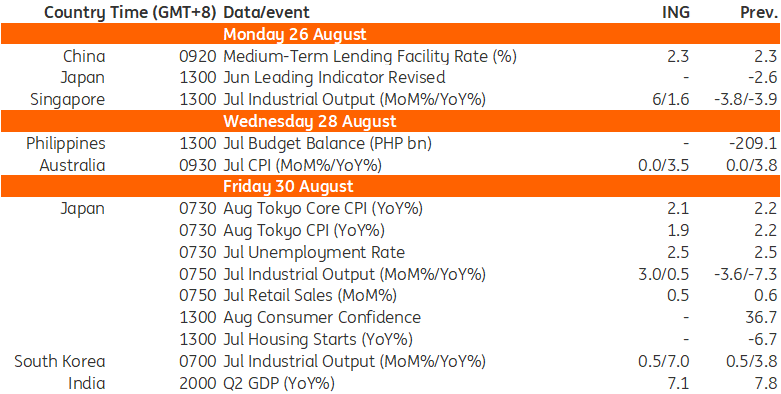Asia Week Ahead: A Week Of Upbeat Data Beckons

Image Source: Pixabay
Japan: Data dump in the week ahead
It's the usual end-of-month data dump week in Japan. We expect the data overall to point to a recovery, and so we think the Bank of Japan will continue on its path to policy normalisation. However, the BoJ will likely normalise policy at a slightly slower pace than previously expected due to concerns that excessive market fluctuations could hurt growth and inflation. Even though we have withdrawn our BoJ hike call for October, a hike in December remains a possibility.
Tokyo’s consumer inflation is expected to drop from 2.2% year-on-year in July to 1.9% in August, mainly due to the government’s temporary energy subsidy programme. However, service sector prices are likely to grow at a faster pace than in the previous month due to strong wage growth. Elsewhere, industrial production should rebound 3.0% month-on-month seasonally-adjusted (vs -4.2% in June) as auto production begins to gradually recover, and recent export data suggests that semiconductor-related output should have also improved. Labour market conditions will likely remain tight as chronic labour shortages persist.
China: Lending facility rate and industrial profits data
The People's Bank of China will announce its one-year medium-term lending facility rate and volume at its new delayed time next Monday. From now on, the MLF will be published around the 25th of every month. The decision was likely made as another step in the monetary policy framework reform which has the PBoC gradually reducing the MLF’s role as the main policy rate. We are expecting no change in the MLF this month. Aside from this, China will publish its industrial profits data on Tuesday, which have recently recovered to low single-digit growth but could begin facing some pressures again amid recent signs of a manufacturing pullback.
Australia: Inflation report and retail sales data may ease RBA concerns
It’s a busy week in Australia where we have the July inflation report and retail sales releases. CPI may vindicate the recent decision by the Reserve Bank of Australia (RBA) to leave rates on hold at 4.35% in August. A mixture of seasonal factors, some moderation in food price inflation, and falling gasoline prices should deliver a month-on-month change that is close to flat. That will help annual inflation decline to 3.5% YoY, but that will still leave it up from the start of the year when it dipped to 3.4%. Retail sales will also be worth watching as the RBA seems to feel that domestic demand is running hotter than it should be to get inflation back to target. The June increase was 0.5% MoM, and something closer to 0.2-0.3% would probably help to allay fears that the economy is still moving too quickly.
India: Strong second quarter GDP
India publishes second quarter GDP data this week and there should be a slight moderation from the 7.8% pace recorded for 1Q24 down to around 7.1% YoY. This would still be extremely strong. Watch too for the GVA-based output figures which some feel are a more realistic measure of Indian growth, and have been running in the low 6% range. We will also get deficit figures for July. The fiscal year has got off to a very good start and India is ahead of where it needs to be to reach its 4.9% deficit target for the full fiscal year.
South Korea: Industrial production data to gain modestly
Industrial production will probably gain modestly in July. Tech-led production should lead overall growth, but auto outputs may have declined quite significantly. Positive survey evidence suggests a gradual recovery in retail sales but construction and service activity should remain weak.
Singapore: Stronger figures for industrial production
Singapore had a much stronger set of non-oil domestic export figures in July and we should see that reflected in a stronger set of industrial production figures for the same month. The strength should be across the board, with contributions from the major sub-groups, electronics, pharmaceuticals and petrochemicals.
Key events in Asia next week

Source: Refinitiv, ING
More By This Author:
Eurozone Wage Growth Drops Drastically, Paving The Way For A September Cut
Eurozone PMI Picks Up In August Amid Olympics Boost
Polish Retail Trade Stalls As Consumption Remains Key Growth Driver
Disclaimer: This publication has been prepared by ING solely for information purposes irrespective of a particular user's means, financial situation or investment objectives. The information ...
more


